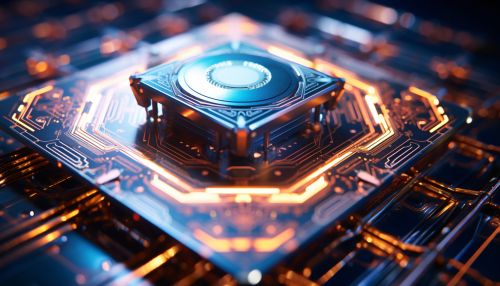Quantum Information Processing in Topological Phases
Introduction
Quantum Information Processing (QIP) is a rapidly developing field that exploits the principles of quantum mechanics to perform computational tasks. One of the most promising directions in QIP is the use of topological phases of matter. These phases, which are distinct from the usual phases of matter (solid, liquid, gas), are characterized by their topological properties and have the potential to host robust quantum bits (qubits), the basic units of quantum information.


Topological Phases of Matter
Topological phases of matter are a new class of phases that are not described by the traditional Landau theory of phase transitions. Instead, they are characterized by their topological invariants, mathematical quantities that remain constant under continuous deformations. This gives rise to exotic phenomena such as quantum Hall effects and topological insulators, which have been the subject of intense research in condensed matter physics.
Quantum Hall Effects
The quantum Hall effect is a quantum-mechanical version of the classical Hall effect, observed in two-dimensional electron systems subjected to a strong magnetic field. The quantum Hall effect is characterized by the quantization of the Hall conductance, a topological invariant. This quantization is remarkably precise, making the quantum Hall effect a standard for electrical resistance.
Topological Insulators
Topological insulators are materials that behave as insulators in their interior but whose surface contains conducting states. This is a result of the non-trivial topological order of the bulk material, which forces the existence of these surface states. Topological insulators have been proposed as a platform for realizing topological qubits.
Quantum Information Processing
Quantum information processing is a generalization of classical information processing, where information is stored and manipulated in quantum states. This allows for the realization of quantum algorithms, which can solve certain problems faster than classical algorithms. The basic unit of quantum information is the qubit, a quantum system that can exist in a superposition of two states.
Quantum Algorithms
Quantum algorithms are computational procedures that use quantum mechanics to solve problems. The most famous quantum algorithm is Shor's algorithm, which can factor large numbers exponentially faster than the best known classical algorithms. Other notable quantum algorithms include Grover's search algorithm and quantum phase estimation.
Qubits
A qubit is the basic unit of quantum information. Unlike classical bits, which can be either 0 or 1, a qubit can exist in a superposition of these states. This allows for a much larger computational space, enabling the realization of quantum algorithms. Qubits can be realized in various physical systems, such as spins of electrons, photons, or topological phases of matter.
Topological Quantum Computing
Topological quantum computing is a proposed approach to quantum computing that uses topological phases of matter to realize qubits. The main advantage of this approach is the inherent robustness of the qubits to local perturbations, due to the topological nature of the underlying states. This could potentially solve the problem of decoherence, one of the main challenges in realizing a practical quantum computer.
Topological Qubits
Topological qubits are qubits realized in topological phases of matter. They are characterized by their topological properties, which make them robust to local perturbations. This is because the information is stored non-locally, in the global properties of the system, making it hard to disturb by local noise. This property makes topological qubits a promising candidate for realizing a fault-tolerant quantum computer.
Decoherence
Decoherence is the process by which a quantum system loses its quantum properties due to interactions with the environment. This is one of the main challenges in realizing a practical quantum computer, as it leads to errors in the computation. The use of topological qubits could potentially overcome this problem, due to their inherent robustness to local noise.
Conclusion
Quantum information processing in topological phases of matter is a promising direction in the field of quantum computing. The use of topological phases could potentially overcome some of the main challenges in realizing a practical quantum computer, such as decoherence. However, much research is still needed to fully understand these phases and how to manipulate them for quantum computation.
